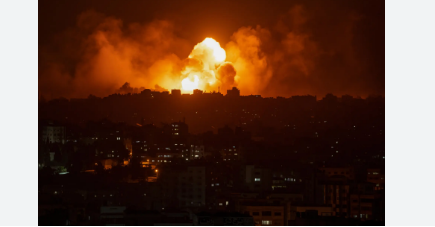New York (Web Desk): The situation in Gaza has been described as "hell on earth" by United Nations officials following a deadly series of Israeli airstrikes on Tuesday that left over 400 Palestinians dead, including many women and children.
These attacks came after a period of relative calm during the holy month of Ramadan, heightening fears of a renewed escalation in the ongoing 17-month conflict, which has already resulted in tens of thousands of deaths and left Gaza in ruins.
The airstrikes targeted various locations across the Gaza Strip, including northern Gaza, Gaza City, Deir al-Balah, Khan Younis, and Rafah, following two weeks of a tight Israeli blockade that had already cut off essential humanitarian aid to the region.
UN Secretary-General Antonio Guterres expressed his shock over the airstrikes, with his spokesperson stating that they had led to significant civilian casualties. Farhan Haq, Guterres' Deputy Spokesperson, called on all parties to "respect the ceasefire, restore unimpeded humanitarian assistance, and unconditionally release the remaining hostages."
In response to the bombings, Muhannad Hadi, the UN's Humanitarian Coordinator for the Occupied Palestinian Territory, condemned the attacks, calling them "unconscionable" and emphasizing the need for a ceasefire to end the hostilities and allow for aid, hostages' release, and the restoration of basic services.
One volunteer from Medical Aid for Palestinians, Dr. Tanya Haj Hassan, described the situation in the emergency room at Nasser Hospital as chaotic.
She recounted treating at least five patients who died in the emergency room, with most of the casualties being "children, women, and the elderly," many of whom were "caught in their sleep, still wrapped in blankets."
Philippe Lazzarini, head of UNRWA, shared his horror over the "awful scenes of civilians killed among them children" after the heavy bombardment. He warned that any resumption of war would "only bring more despair & suffering," urging that "a return to the ceasefire is a must."
The UN's High Commissioner for Human Rights, Volker Turk, expressed similar outrage, stating that the recent airstrikes would "add tragedy onto tragedy" and stressing that the violence, which has been ongoing for over 18 months, shows there is no "military solution" to the conflict.
Turk called for a halt to Israel's military operations, stating that continued force would only deepen the suffering of Palestinians.
He further emphasized the need for "immediate and unconditional release of all hostages and arbitrarily detained individuals," advocating for the war to end permanently.
Tom Fletcher, the UN Emergency Relief Coordinator, conveyed alarm to the Security Council, revealing that the "worst fears materialized" as airstrikes continued across Gaza, with unconfirmed reports indicating that hundreds had been killed.
Fletcher also highlighted the worsening situation in the West Bank, where Israeli military operations have intensified. Since the beginning of the year, 95 Palestinians have been killed, including 17 children, and 869 injured, with over 40,000 displaced as Israeli tanks have been deployed for the first time in two decades.
He urged for three critical actions: unimpeded access to humanitarian aid, a renewed ceasefire, and increased funding for humanitarian efforts, condemning the blockage of food, water, and medicine as "unconscionable."
He shared a chilling message he had seen scrawled on a hospital whiteboard in Gaza, written by a doctor who was later killed: "Whoever stays until the end will tell the story. We did what we could. Remember us."


